
- Home
- About Us
- Sustainability
- Investors
- News
- People & Culture
-
Regions
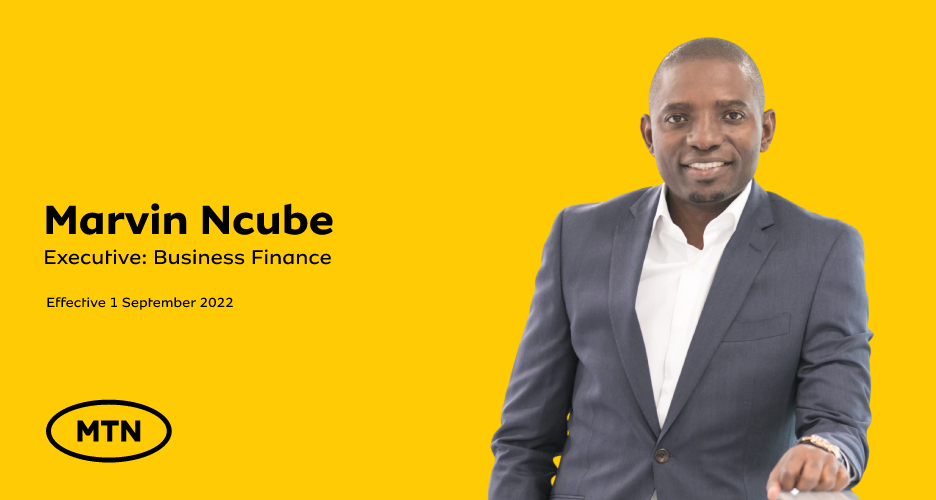
MTN Group is pleased to announce that Marvin Ncube has been appointed Executive: Business Finance, effective 1 September 2022.
Marvin is a seasoned finance executive with more than 19 years’ experience in strategic business planning, business performance, capex management, statutory reporting and revenue assurance.
In his role, Marvin will lead three core finance sub functions which impact and influence financial business performance for the Group. These are Group Financial Planning and Analysis, Regional and Manco Finance Business Partnering and Group Capital Management.
“Given his vast experience, expertise and accomplishments, I am confident that Marvin will add immense value to these portfolios and to the Group,” said Tsholo Molefe, Group Chief Financial Officer.
Marvin joins MTN Group from Telkom, where he was the Group Executive: Group Financial Controller. Prior to Telkom, he was the Finance Business Partner (Divisional CFO) at Eskom.
He served on a number of boards including the South African Dental Association (SADA), Mozambique Transmission Company (Montraco), Eskom and Trans-Africa Projects, providing strategic insights and direction.
Marvin is a CA (SA) with an MBA from University of Pretoria (GIBS). He also holds a Bachelor of Commerce (Accounting) degree from Rhodes University and a Postgraduate Diploma from the University of Cape Town.
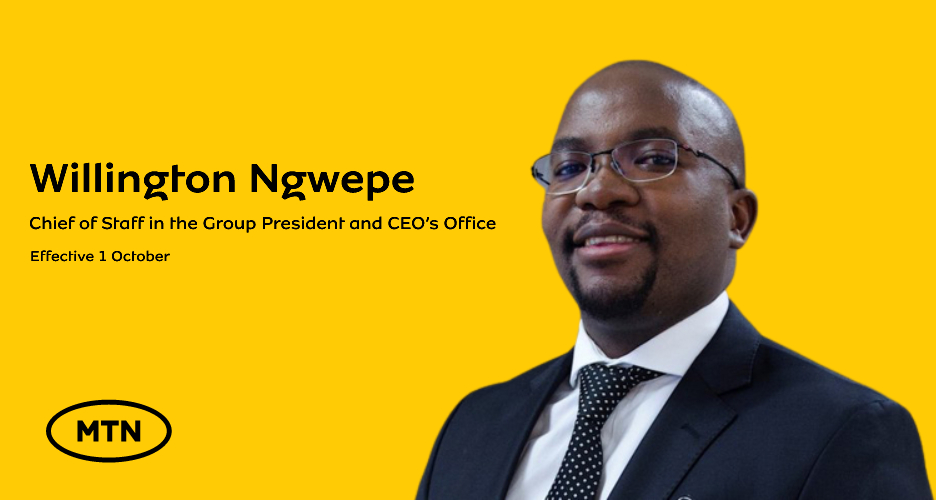
MTN Group is pleased to announce the appointment of Willington Ngwepe to the new post of Chief of Staff in the office of the Group President and Chief Executive Officer, effective 1 October 2022.
Willington joins from the Independent Communications Authority of South Africa (ICASA), where he has spent the last five years as CEO. Before that, he was ICASA’s chief operating officer.
“Willington brings with him extensive leadership, technology and regulatory experience that will be invaluable as we execute on our strategic intent of leading digital solutions for Africa’s progress,” said MTN Group President and CEO Ralph Mupita. “We welcome him to the MTN Group, where his focus will be on providing advisory, strategic and operational support on specific matters driven directly from the GCEO office.”
Willington has a LLB and LLM (Communication Law) from the University of the Witwatersrand, and an LLM (Tax Law) from the University of South Africa.

MTN Group reported a resilient performance in the first half of 2022, balancing an accelerated investment into its networks, reducing the cost to communicate and the delivery of solid financial results.
We advanced the delivery of our strategy under challenging conditions, which included macroeconomic and geopolitical volatility, global supply chain disruptions, constrained on-grid power supply in South Africa and greater regulatory requirements across many markets.
“Notwithstanding the tough macro conditions, MTN remained focused on investing in our markets to increase broadband coverage and to reduce the cost to communicate,” said President and CEO Ralph Mupita. “We accelerated network investment to R17.1 billion and spent an additional R7 billion on securing 4G and 5G spectrum in the key markets of South Africa and Nigeria.”
The investment in networks increased access to broadband services to 85.5% of the population and led to an average 22.5% reduction in data tariffs. Our contribution to society and economies also included cash taxes of R7.3 billion paid to nation states in the period.
In driving investment that grows gross capital formation, the contribution we made to jobs and the fiscal resources of nation states was underlined by good financial results in the first six months of 2022.
In constant-currency terms, service revenue grew by 14.8% to R92.5 billion; earnings before interest, tax, depreciation and amortisation (EBITDA) increased by 15.1% to R43.9 billion before once-off items; and the EBITDA margin expanded by 0.3 percentage points to 45.3%. This was supported by the focused execution of our expense efficiency programme.
“Growth in data revenue was particularly strong, up 35.9%, driven by MTN Nigeria, MTN Ghana, MTN Cameroon and MTN South Africa,” said Mupita, adding that fintech revenue grew by 14.0%, with solid performances from Nigeria, Uganda and Ghana.
“The introduction of fintech taxes in some markets slowed revenue growth in Q2, but we remain encouraged by the ecosystem growth as users, agents and merchants continued to grow healthily during the period under review, with transaction volumes growing by 31.5% during the period.”
As part of our Ambition 2025, we are building five scale platform businesses on top of a very strong connectivity network. The fintech platform is the most mature of these, and in the first half it had 60.7 million Mobile Money users (up 24% year-on-year), generating six billion transactions worth US$116.3 billion. The total number of MTN subscribers in the period was 281.6 million, up 5.6%.
We made progress in our work to separate our fintech and fibre businesses from our GSM business and have started the process of engagement with select potential strategic investors into the Group Fintech structure, the outcome of which should be concluded by the end of the year.
Chief Financial Officer Tsholo Molefe said the Group accelerated the deleveraging of the balance sheet in the six months to end-June 2022, boosted by the repatriation of R9.4 billion in cash from operating companies, including R4.5 billion from Nigeria: “We continue to explore opportunities for further liability management and remain focused on reducing the hard currency liabilities on our balance sheet.”
Underlying operating free cashflow growth was strong at 24.0%, and return on equity increased to 24.2%, reflecting the consistent delivery of earnings.
We accelerated our portfolio transformation, delivering R9.2 billion in asset realisations in the first half and bringing the total realised since March 2020 to R15.8 billion, with proceeds supporting the group leverage and liquidity positions, which strengthened during the period. In line with our pan-Africa focus, we accepted a binding offer for 100% of MTN Afghanistan.
Localisations remained important in the period, as we prioritised creating shared value, broadening local participation and deepening capital markets. In Ghana we increased local ownership to 23.7% through share sales to pension funds and strategic investors.
Mupita said the headwinds facing customers and the business looked likely to persist in the second half.
“The business is well positioned to navigate the prevailing market conditions. In South Africa, we are focused on improving the resilience and availability of the network, given the constrained on-grid power situation. Battery and generators solutions will be deployed to restore network availability to the world-class standards our customers have been used to. This resilience plan will be executed within the capital expenditure envelope of the business.
“If we experience the same level of loadshedding in H2 as we did in H1 in South Africa, service revenue will come in slightly under guidance, with margins at the lower end of the range communicated to investors. The structurally higher growth opportunities in our markets continue to support the investment case of a compelling Africa growth story that delivers digital and financial inclusion to Africans,” he concluded.

MTN Group’s Mobile Money Application Interface (API) is inviting developers across several markets to participate in an Open API Hackathon, with a challenge to create a mobile application that uses MoMo APIs for use in their markets.
The hackathon will be the second conducted by MTN Group Fintech and will take place in the following countries: eSwatini, Zambia, Congo Brazzaville, Rwanda, Uganda, Cameroon, Benin, Cote d’Ivoire, Ghana and Guinea Conakry.
Developers will compete to create an innovative application for the markets in which they are registered, which can process financial transactions with added capabilities that go beyond processing payments and drive both financial inclusion and literacy.
“MTN is committed to extending financial and digital inclusion across the continent in furtherance of its strategy to build a pan-African Fintech platform that will power the digital economy and serve as a catalyst for social and economic growth in Africa,” said Serigne Dioum, MTN Group Chief Fintech Officer.
“With our Open API Platform, we reach out to Africa’s resourceful talents and enable them to grow and create opportunities by leveraging our MoMo Platform. We have no doubt that it is by collaborating with the talents of Africa that we will expand the service offering available on MoMo,” he added.
About the challenge:
Finalists stand the chance to win up to USD 5000 in prize money in their respective country.
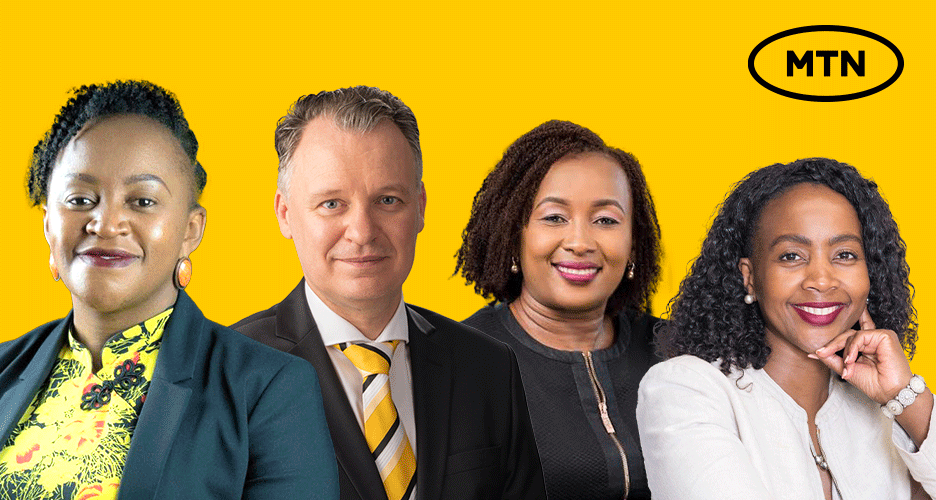
To support the accelerated execution of our Ambition 2025 strategy, MTN Group is pleased to announce the appointment of new CEOs for operations in Cameroon, Rwanda and Uganda effective 1 September 2022.
MTN also announces the creation of a new senior MTN Group post: that of Operations Executive for Liberia, Guinea-Conakry, Guinea-Bissau, and Congo-Brazzaville effective 1 August 2022, reporting to the Senior Vice President: Markets, Ebenezer Asante -Twum.
“The appointment of these executives, all with strong track records of execution and results, adds to our confidence on delivery of our Ambition 2025 strategy”. says MTN Group President and CEO Ralph Mupita.
MTN Rwanda CEO Mitwa Ng’ambi becomes CEO of MTN Cameroon, replacing Stephen Blewett, who is leaving the Group.
Ng’ambi oversaw the listing of MTN Rwanda as well as the establishment of its fintech subsidiary. She was instrumental in strengthening the business’s stakeholder engagement and has also worked in MTN’s Benin and Zambian operations.
MTN South Africa Chief Consumer Officer Mapula Bodibe takes the helm at MTN Rwanda, bringing with her more than 15 years’ experience with MTN, including in Uganda.
She has a strong background in commercial strategy, consumer marketing, customer strategy, brand management and communications, product management and customer analytics.
Sylvia Mulinge becomes MTN Uganda CEO, joining from Safaricom, where she served as Chief Consumer Business Officer for the Group. A seasoned executive, she brings with her a passion for transforming customers’ lives using technology.
Mulinge replaces Wim Vanhelleputte, who will take on the new MTN Group role of Operations Executive: Markets. In this position, he will leverage his experience in furthering financial inclusion and strengthening MTN’s position as a market leader.
Vanhelleputte is a former MTN Côte d’Ivoire CEO and has extensive operational experience across Africa.
“My thanks to Stephen for his valuable contribution to the MTN Group over the years and wish him well as he journeys to new opportunities outside of the African continent. I welcome Sylvia to the Y’ello family and look forward to working with her, as well as with Mitwa, Mapula and Wim in their new roles, as we continue to execute on our Ambition 2025 strategy, ” says Mupita.

MTN Group today released the second instalment of its brand refresh with the ‘Voice’ brand film that highlights how a simple ingredient of life, in this case your voice, can impact and change the way people see the world, and inspire progress.
In February, MTN launched its new logo and brand campaign to anchor its strategy, Ambition 2025, to build leading digital solutions that enable Africa’s progress across the telecom, fintech, infrastructure, API and content and messaging ecosystem.
The “What are we doing today?” campaign is driven by the insight that all progress comes from action and that the energy and optimism of Africa’s people together with MTN’s commitment to enabling Africa’s digital progress, will contribute to the progress of consumers, countries and ultimately, the African continent.
Africa is a continent with significant potential and MTN is intent in playing its part in harnessing this potential by bringing relevant solutions to consumers that enable digital and financial inclusion and help them progress in their daily lives.
“Africa’s youth are at the core of this potential and progress, and our brand refresh centres on them as they hold the future in their hands. With the ‘Voice’ brand film, we hope to inspire in them that their voices matter, and to use the power of their voice to impact positive change and advance the progress of everyone on the continent,” said Bernice Samuels, Executive for Marketing.
As an extension of the release of the ‘Voice’ brand film, MTN Group has partnered with TBTM Studios to sponsor Season 3 of the ‘The Mic: Africa’ an interactive talent search programme aimed at empowering and uncovering talented youth across the continent. This production is an embodiment of MTN’s commitment to finding and giving “do-ers” from across Africa an opportunity to use their voice to respond to the invitation of ‘’What are we doing today?’’ The public will be able to view The Mic: Africa on the Premium Free TV app via ayoba, the Superapp, taking Africa by storm.
MTN is looking forward to revealing the details of the involvement and association with this exciting production in the next few weeks.
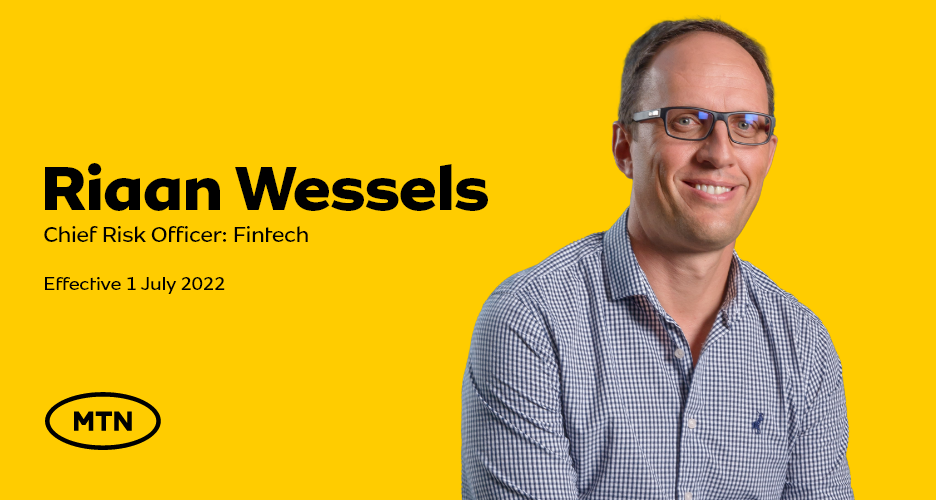
MTN Group is pleased to announce the appointment of Riaan Wessels as Chief Risk Officer: Fintech with effect from 1 July 2022.
Riaan has 13 years’ experience at MTN. He first joined the company in 2004, as General Manager: Business Risk Management and returned in 2017 as Group Executive: Risk and Compliance.
“As Chief Risk Officer: Fintech, Riaan will continue to add immense value at MTN by effectively managing risk exposures to the business and ensuring robust processes and controls,” said Serigne Dioum, Group Chief Fintech Officer.
Over the past 20 years, Riaan has implemented complex programmes at multinational companies in the technology and telecommunications industries. This includes leading large risk management, compliance and internal audit teams across operating environments in the Middle East and Africa.
Riaan holds a BComm Honours degree from the University of Free State in Accounting, Auditing and Tax and a Postgraduate diploma in Business Leadership from GIBS.
He is also a Board member of MTN Rwanda and MTN Côte d’Ivoire as well as Member and Chairman of the Board of MTN Guinea Conakry
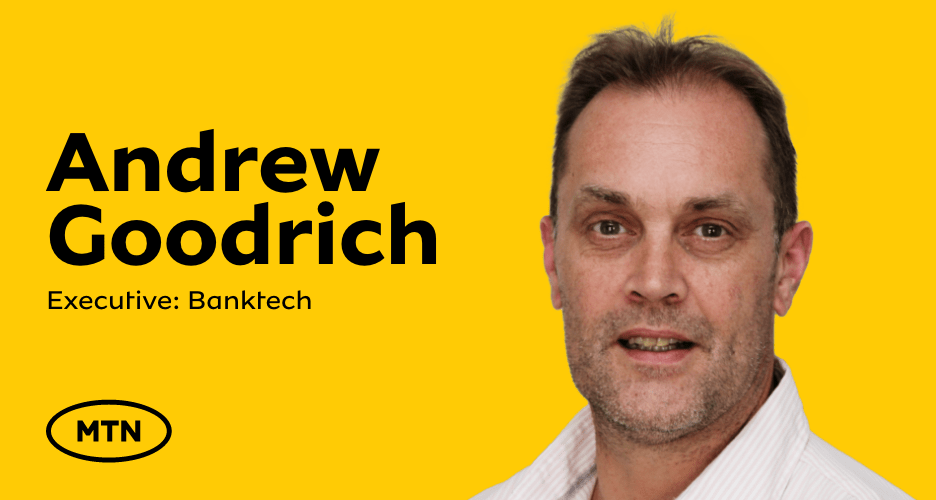
MTN Group is pleased to announce the appointment of Andrew Goodrich as Executive for Banktech in our Group Fintech team, effective, 1 June 2022.
Andrew joined MTN in 2019 as a General Manager for Banktech & Beyond Payments division, where he has added immense value in executing our digital banking strategy.
“We are delighted to welcome Andrew into his new role within the Group Fintech Team. Andrew is no stranger to MTN and his wealth of experience in the financial sector, will ensure we continue to make a meaningful contribution, as we drive our financial inclusion ambitions on the continent.” said Serigne Dioum, Group Chief Fintech Officer.
“Andrew has 30 years’ experience in the financial services sector, twelve of which were spent at senior leadership level. Andrew has built a stellar career through his innate ability to craft an organisational vision, mobilise strategic and tactical plans, and execute with well-led and highly effective teams. He is a strategic yet practical leader, renowned for his hands-on approach to business”, concluded Dioum.
Prior to joining MTN, Andrew was involved in a number of start-ups. This includes a niche credit risk solutions consultancy, which was successful in assisting several start-ups in South Africa (SA), as well as an e-commerce and digital credit provider and numerous Fintech/ Finserv businesses throughout South Africa, Africa, and Asia.
We congratulate Andrew and wish him the very best in his new role.
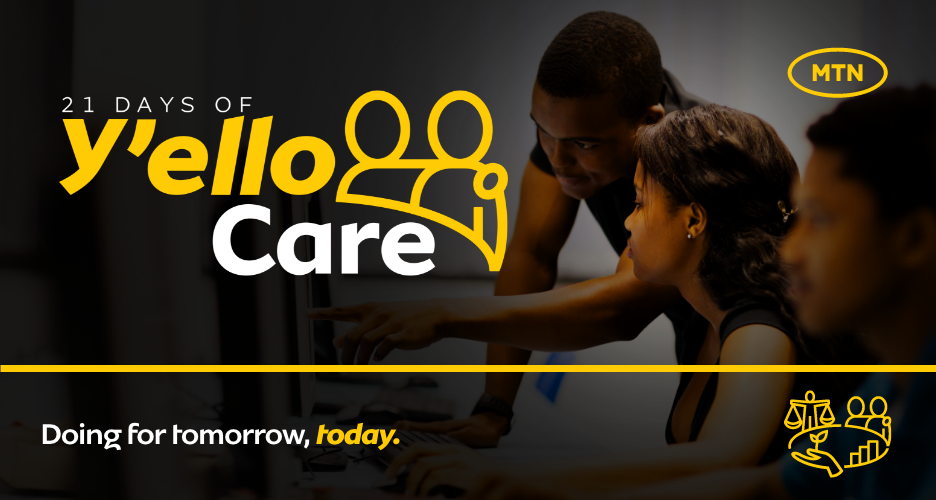
MTN Group is pleased to announce the resumption of its Y’ello Care employee volunteering programme after two years of Covid-19. The annual event aims to secure high participation levels of MTN staff in high impact social projects to uplift and empower the local communities in which the company operates.
The programme, kicking off on 1 June until the 21st, is themed “Empowering Communities to Drive Economic Recovery”. The aim is to inspire MTNers to heed the call to upskill local communities in order to drive economic activity and participation through focusing on digital skills training and digital job creation. This is linked to MTN’s strategic priority to build digital skills for digital jobs aligned to the company’s Ambition 2025 Strategy.
“As MTNers it is imperative that we continue to contribute to our societies and ensure that the communities in which we operate see the value of the business in their lives,” MTN Group Chief Sustainability & Corporate Affairs Officer Nompilo Morafo said.
MTN is committed to adding economic value by contributing to society through its programmes focused on digital education, digital skills and digital skills training. The company believes that reducing the digital skills gap will help address issues of digital and social inequalities while at the same time ensuring the sustainability of the business.
“With a new strategic focus on digital skills for digital jobs, kicking off our Y’ello Care initiatives by focusing on empowering communities to drive economic recovery after Covid-19 through training, upskilling, and knowledge sharing will create lasting and sustainable change. Working with women, youth, disadvantaged populations, and people at risk will help uplift our communities and will add value to the work done in 2019, while pathing the way for new opportunities under this new strategic direction,” Morafo added.
At MTN, we believe that everyone deserves the benefits of a modern connect life and by resuming our Y’ello Care campaign, we strive to ensure that we continue to strengthen and uplift all of our community members in their pursual of economic development within each community.
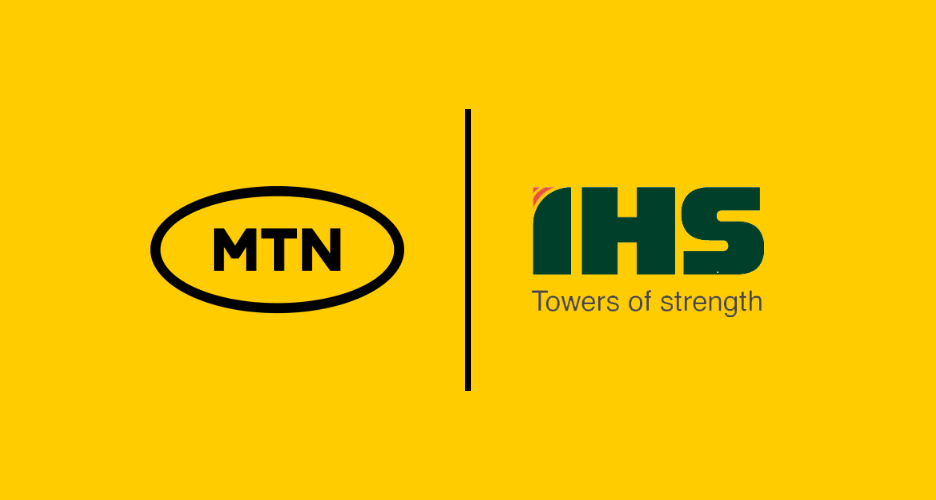
IHS Holding Limited (NYSE: IHS) (“IHS Towers”), one of the largest independent owners, operators, and developers of shared communications infrastructure in the world by tower count, has completed the acquisition of 5,701 towers in South Africa from Mobile Telephone Networks Proprietary Limited (“MTN SA”), one of the leading mobile telecommunications operators in South Africa (the “Transaction”). Under the agreement, IHS Towers is also providing Power Management Services to MTN SA on approximately 13,000 sites, including the acquisition portfolio, across South Africa.
Cash consideration for the Transaction is ZAR6.4 billion[1]. The acquired assets as well as the provision of Power Management Services across MTN SA’s portfolio are expected to deliver Revenue and Adjusted EBITDA of approximately US$192 million and US$85 million, respectively, in the first full year of operations.[2] This transaction has received the necessary regulatory approval from the South African Competition Commission.
The Power Management Services component of the transaction is aligned to IHS Towers’ existing service offering in other African markets – this service will be delivered to the acquired sites, as well as to other third-party sites on which MTN SA is present. This service will primarily involve power systems and security at sites.
IHS Towers will own 70% of the South African Towers business with the remaining 30% to be owned by a B-BBEE consortium.
With this acquisition, IHS now has an operational footprint in eleven emerging markets with seven in Africa, in addition to four in Latin America and the Middle East, with a global tower count of nearly 39,000 towers.
Sam Darwish, IHS Towers Chairman and CEO, commented “The closure of this acquisition is an important milestone in IHS’ growth story. IHS was founded in Africa and the region continues to be a key anchor for our company. Through this transaction, IHS has now entered the most industrialised economy in Africa as South Africa’s largest independent tower operator. MTN Group have been a long-term partner of IHS, and I am delighted that we will expand that collaboration and facilitate mobile connectivity in South Africa. We will leverage our deep operational excellence and engineering expertise, honed across our other African markets, to meet South Africa’s increasingly sophisticated data demands and expedite the roll-out of new technologies.”
Ralph Mupita, MTN Group President and CEO commented “With the regulatory approvals and all conditions precedent to the deal finalised, we are pleased to have IHS bring global capabilities to our South Africa network. Additionally, with this deal, we continue to deliver on our Asset Realisation Programme, strengthening the balance sheet and improving returns.”
“Over the years, MTN SA has built and maintained the best network in the country, and we believe that in IHS, we have found a partner with the necessary experience and expertise to maintain and enhance this critical part of the business. This international partnership also brings foreign investment into the market to create greater competition,” added Charles Molapisi, MTN SA CEO.
[1] On a cash and debt free basis, excludes IFRS 16 lease liabilities estimated to be ZAR4.6 billion.
[2] 12-month Revenue and Adjusted EBITDA annualized for FY 2022 outlook. Revenue includes power pass through on acquired sites that will take time to materialise in our revenue. Note that revenue has been adjusted down when compared to our initial announcement last November as we will only be providing power pass through on the towers being acquired, and not on those owned by third parties.